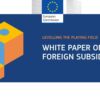Blog Archive

EU Digital COVID Certificate: A quid pro quo for travelling
Whilst the responses of the World Health Organization and the EU to the Covid-19 pandemic seem to be aligning, there is still uncertainty as to the facilitation of free movement not only within the EU but also internationally. In this blogpost, Raluca Nedelcu and Lucky Belder argue that governments worldwide have adopted measures without concern for their long-term impact on the global economy and the UN’s Sustainable Development Goals. Public health measures such as the EU Digital COVID Certificate should take their impact on international relations into account and, in particular, measures adopted by governments should not create discrepancies and unfair advantages at an international level.
Read more
EU Digital COVID Certificate: A quid pro quo for travelling
Whilst the responses of the World Health Organization and the EU to the Covid-19 pandemic seem to be aligning, there is still uncertainty as to the facilitation of free movement not only within the EU but also internationally. In this blogpost, Raluca Nedelcu and Lucky Belder argue that governments worldwide have adopted measures without concern for their long-term impact on the global economy and the UN’s Sustainable Development Goals. Public health measures such as the EU Digital COVID Certificate should take their impact on international relations into account and, in particular, measures adopted by governments should not create discrepancies and unfair advantages at an international level.
Read more
The EU Commission’s report on new genome editing techniques: a treasure trove for sustainable CRISPR food – or a Pandora’s box?
Genome editing in plants can deliver beneficial crop properties such as drought and pest resistance, but the resulting products are also feared by some to lead to health and biodiversity risks in the long term. On 29th April 2021, the EU Commission published its long-awaited report on new genome editing techniques, hinting at deregulation of products resulting from genome editing amidst accusations of aggressive biotech industry lobbying. In this blogpost, Pauline Phoa discusses the legal background to the Commission’s report, as well as some concerns about the way forward.
Read more
Uitsluiting van ontvangers van buitenlandse subsidies in aanbestedingsprocedures: bezinning geboden!
In juni 2020 heeft de Europese Commissie een witboek gepubliceerd over het tot stand brengen van een gelijk speelveld wat betreft buitenlandse subsidies. Een belangrijk onderdeel van het witboek is hoe dit spanningsveld uitwerkt in het kader van procedures voor het plaatsen van overheidsopdrachten. De Commissie constateert dat sprake is van een lacune in de regelgeving, om vervolgens een voorstel te doen voor een nieuwe wettelijke uitsluitingsgrond in aanbestedingsprocedures. In deze blogpost zal Emma Wiggers onderzoeken met welke initiële kanttekeningen de Commissie rekening moet houden.
Read more
Origin-labelling legislation in the EU: striking the balance between free movement and consumer protection
Consumers increasingly want access to information regarding the origin of products. Buying local is en vogue, offering a sense of greater certainty as to the quality and safety of products, the hope of a lower carbon footprint and a way to support local communities. This trend, however legitimate, also provides an opportunity for States to promote their domestic production – a temptation which is only getting stronger with the current economic crisis and the need to rescue national economies. In this context, origin-labelling can be used as a tool to guide consumers towards local purchases. In this post, Vincent Delhomme shows how EU law currently prevents Member States from imposing wide ranging origin-labelling requirements on products and argues, should any reform take place, for preserving the overall spirit of this legal framework.
Read more
Digital forensics standards: Enforcement under the radar of EU plans for electronic evidence
In the ninth post in RENFORCE Blog’s special series on enforcement, Gavin Robinson argues that the extreme volatility of electronic data calls for EU law to promote not only efficient and secure access thereto for criminal investigators, but also robust standards of digital forensics. Currently, it is national laws and criminal justice systems which achieve varying levels of forensic soundness for digital evidence. Drawing on a comparative, multidisciplinary research project and sharing insight from legal practice in Luxembourg, the post advocates a stronger emphasis on the development of common European rules on digital forensics – potentially within dedicated EU legislation on the admissibility of evidence.
Read more
Closing the gender pay gap: time for the Member States and all stakeholders to finally put their money where their mouth is
Statistics clearly show that not a single country in the European Union has managed to establish equal pay for women and men. In this blogpost, the eighth in RENFORCE Blog’s special series on the enforcement of EU law, Linda Senden and Rian Hesdahl argue that a major reason for this lack of progress is a strong reliance on individual-rights-based enforcement, before examining whether the new directive proposed by the European Commission is likely to significantly boost the effective enforcement of the equal pay principle.
Read more
Ecocentric values and enforcement in illegal environmental markets
The EU is an important market for illegal environmental trades – such as timber, wildlife, fish, waste, minerals and metals – which are causing serious harms to the environment worldwide. In this blogpost, the seventh in RENFORCE Blog’s special series on the enforcement of EU law, Daan van Uhm argues that ecocentric values should be embedded in both EU legislation and in EU law enforcement cultures.
Read more
Access to justice and EU enforcement agencies in the field of migration: an emerging problem
In this post, part of a special RENFORCE Blog series on the enforcement of EU law, Salvatore Nicolosi acknowledges the potential of EU migration agencies to support Member States in enforcing EU rules, but explains how an enhanced form of EU law enforcement through agencies should not be detrimental to the legal guarantees of migrants.
Read more
“Stuck in the middle with you”, the case for keeping illiberal Hungary and Poland within the EU (for now)
Kees Cath
Poland and Hungary’s threatening to block the EU budget because of the link between the Multi-Annual Financial Framework (MFF) and the rule of law, in combination with their continued undermining of the rule of law domestically has led to a debate on whether these countries should remain in the EU. In this post PhD student Kees Cath argues that working towards expulsion would not be appropriate at this point.
The opinions expressed in this article are the author’s own point of view.
Read more
